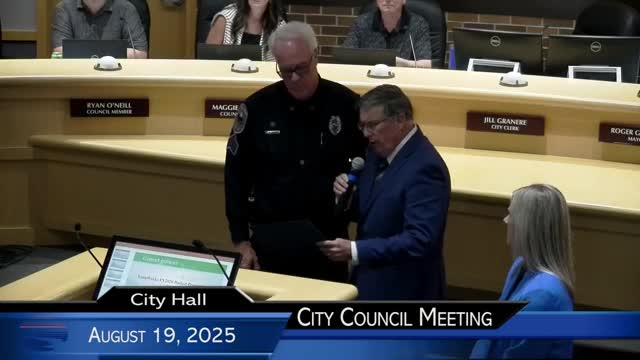Nebraska Game and Parks previews plan to incorporate Camp Augustine into state park system; council and community debate South Locust trail timing and cost
Get AI-powered insights, summaries, and transcripts
Subscribe
Summary
Nebraska Game and Parks officials told Grand Island’s City Council on Aug. 19 they intend to pursue incorporation of Camp Augustine into the state park system and to fund development through a combination of state, foundation and philanthropic support.
Nebraska Game and Parks representatives told the Grand Island City Council on Aug. 19 that the department intends to pursue incorporation of Camp Augustine and adjacent acreage into the state park system and that state officials and the Game and Parks Foundation will seek philanthropic support to develop camping, an outdoor education center and other amenities.
Timothy McCoy, director of the Nebraska Game and Parks Commission, and Jim Swenson, deputy director, told the council the work to consolidate ownership on the south side of the Platte River is complete and that the legislature passed LR17 to allow Game and Parks to pursue planning and budgeting for the site. Both officials said the plan envisions phased development — rapid early infrastructure and campgrounds to generate visitors and revenue, followed by additional amenities — and that the Game and Parks Foundation and donors would play a central role in funding construction.
Council and the mayor praised the partnership, and several councilmembers called the potential state park a generational opportunity. McCoy and Swenson said the park would complement Grand Island’s trail network and regional attractions and help attract visitors for multi‑day stays.
That state‑park discussion segued into a longer presentation and community debate about a proposed hike/bike trail along South Locust Street to link the city to Camp Augustine. Grand Island Tourism Director Brad Melamed and bike‑industry representatives urged the council to see the trail as a transformational, connective investment — one that would unify existing city trails, give access to the state park and attract reunions, RV visitors and day users. Melamed and local cycling business owner John Wayne noted regional examples where trail access supported local tourism and new development.
Several councilmembers and residents supported the trail as a long‑term community asset. Others urged caution because the likely per‑mile construction cost presented to council is high. Councilmember Nickerson said early estimates translate to roughly $1–2.5 million per mile depending on surfacing and bridge needs, and recommended exploring value engineering and external funding before committing local dollars. Councilmember Lanfear argued the trail is premature until the state park has constructed tangible visitor amenities and warned of competing capital priorities this year.
Game and Parks officials said phasing would allow early work such as campgrounds and utilities to proceed quickly if fundraising succeeds, but they emphasized the timeline depends on private and foundation fundraising. They also said state park status — one of only eight state parks in Nebraska — would be a major regional asset and could draw visitors and revenue to Grand Island.
Council did not take a final vote on trail construction at the meeting. Staff and partners said they will continue fundraising and refine cost estimates and phasing before bringing a funding request back to council.
